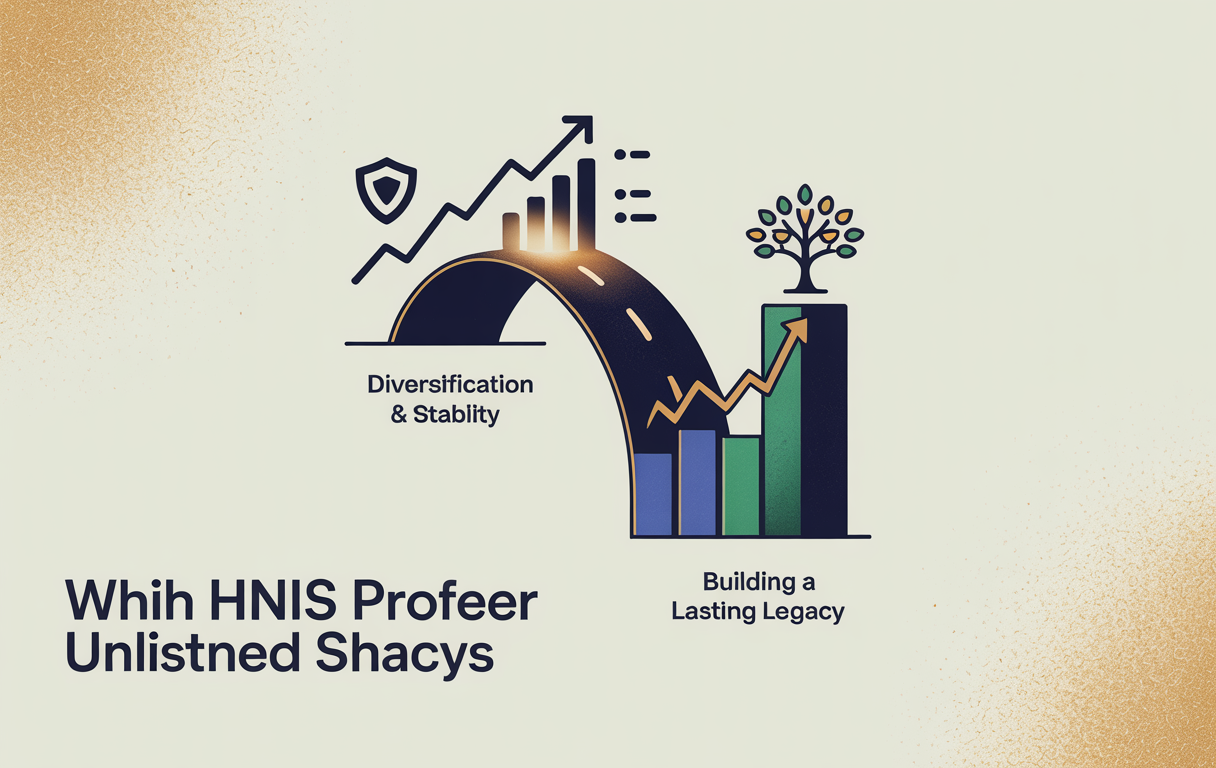For decades, High Net Worth Individuals (HNIs) in India have stuck to a familiar investment playbook. They’ve typically parked their wealth in real estate, gold, fixed deposits, and well-established blue-chip stocks. These traditional options certainly offered safety and steady, though sometimes modest, returns.
However, the financial landscape is changing rapidly, isn’t it? Inflation can quietly erode the value of traditional savings, making your money buy less over time. While the public stock market offers growth, it also comes with daily volatility that can keep you on your toes. This has led many discerning Indian HNIs to seek something more – an investment that offers a distinct edge.
This very search has brought a powerful alternative into the spotlight for HNIs: unlisted shares. Simply put, these are shares of companies not yet traded on public stock exchanges like NSE or BSE. They offer a unique blend of high growth potential and crucial strategic diversification.
So, why are more and more Indian HNIs choosing to invest in unlisted shares? In this article, we’ll dive deep into how these private market opportunities are becoming a key, strategic part of modern wealth creation strategies. We believe they’re truly reshaping the game.
Understanding Unlisted Shares in India: Your Path to Next-Gen Wealth
So, what exactly are unlisted shares? Imagine buying a piece of a private company that hasn’t yet gone through an Initial Public Offering (IPO) or decided to list its shares on a public stock exchange. That’s essentially what unlisted shares are.
It’s like getting in on the ground floor, becoming an early investor in a company’s growth story before it becomes a household name. This approach can offer a profoundly different kind of return compared to publicly traded stocks, don’t you think?
The Allure of Early Entry: Tapping into Exponential Growth
One of the biggest draws? The chance for truly exponential growth. When you invest in a private company, you’re getting in at an earlier, often pivotal, stage. If the company succeeds and eventually goes public or gets acquired, the value of your shares can multiply significantly – sometimes dramatically.
Just think about success stories like Nykaa, Zomato, or Paytm. Many astute investors who bought their shares when they were still unlisted saw massive gains – we’re talking “multi-bagger” returns – when these companies finally made their IPOs. This potential is a powerful magnet for HNIs seeking substantial capital appreciation, wouldn’t you agree?
Diversification: Your Shield Against Public Market Volatility
The public stock market can be quite a rollercoaster. Daily news, global events, and shifting investor sentiment can cause sharp ups and downs that feel unpredictable. Unlisted shares, however, often march to the beat of their own drum, moving independently of the broader market. This makes them an excellent tool for real diversification, don’t you think?
By thoughtfully adding unlisted shares to your portfolio, you’re not putting all your eggs in one basket. Instead, you’re spreading your risk across different types of assets, aiming to make your overall investment portfolio more resilient and stable, especially during market fluctuations. It’s about smart risk management.
Strategic Portfolio Enhancement: Building a Legacy, Not Just Returns
For most HNIs we speak with, building wealth isn’t just about short-term gains. It’s truly about creating a robust financial future, building a lasting legacy, and thoughtfully passing on wealth to future generations. Unlisted shares fit perfectly into this kind of long-term vision.
These investments allow you to align your capital with innovative businesses and disruptive technologies that are shaping tomorrow. Many HNIs, often successful entrepreneurs themselves, tell us they enjoy investing in companies that mirror their own drive and potential for growth. It’s a strategic, forward-thinking move for enduring wealth accumulation.
Unlisted vs. Traditional: A Candid Look for HNIs
Return Potential vs. Risk Profile: Where Do You Stand?
- Unlisted Shares: Here’s where you find higher risk, but also the potential for significantly higher returns. The risk primarily stems from these often being newer, growing companies whose success isn’t guaranteed. And yes, illiquidity is a key factor; you might not be able to sell your shares quickly, so your funds can be locked in.
- Traditional (Listed Stocks/Mutual Funds): These generally offer moderate risk and moderate rewards. They’re typically liquid, meaning you can buy and sell them with relative ease. However, their daily prices are constantly swayed by broader market swings.
- Traditional (Fixed Deposits/Bonds): Consider these low-risk, but with low rewards. While they offer safety, their returns often struggle to keep pace with inflation, potentially eroding your money’s buying power over time.
Accessing Opportunities and Information Transparency
Getting into unlisted shares isn’t like buying a public stock; it typically needs a special ‘in’ – specialized channels and expert guidance. Information about private companies isn’t as readily available as it is for publicly listed ones. So, you’ll need to rely on thorough due diligence and trusted networks to uncover the right opportunities.
In stark contrast, traditional investments like listed stocks are widely accessible. There’s a wealth of public information, analyst reports, and news at your fingertips, making them much easier for anyone to research and invest in.
Liquidity & Your Investment Horizon: A Different Pace
Here’s a key point: unlisted shares typically demand a longer investment horizon, often 3 to 7 years or even more. They are inherently illiquid, meaning you can’t just sell them on a whim like a public stock. Your funds might be locked in until the company goes public or a suitable secondary buyer emerges.
Traditional listed stocks, however, offer high liquidity. You can buy or sell them almost instantly during market hours, giving you that crucial flexibility if you ever need quick access to your funds.
Navigating the Unlisted Market: Your Practical Roadmap for Indian HNIs
Understanding the Risks: What You Need to Be Prepared For
You might be thinking, “Is this too risky?” It’s a valid question. The primary risks, as we’ve discussed, include illiquidity. You absolutely must be comfortable with your money being locked in for a longer period. Valuation can also be tricky for private companies since there isn’t a daily market price to guide you. Always consider the potential for loss right alongside the potential for gain.
Additionally, information scarcity means you have to be extra diligent in your research. We always recommend ensuring you understand the business thoroughly – its model, its market, its team – before committing any capital.
Smart Investing: Your Due Diligence & Evaluation Checklist
Before investing in any unlisted company, you simply must conduct thorough due diligence. This means carefully checking the company’s business model, its market position, and its true growth potential. Always scrutinize the management team’s experience and track record.
Understanding the company’s financial health and its ‘cap table’ – that’s who owns what percentage of the company – is also crucial. Independent valuation reports can provide valuable insights into what constitutes a fair price for the shares. For those keen to explore opportunities to buy unlisted shares in India, this meticulous evaluation is absolutely key.
The Indispensable Role of Expert Guidance
Given these complexities, engaging with experienced wealth managers or specialized platforms becomes truly indispensable. Think of them as your trusted guides. These experts can not only provide access to vetted investment opportunities but also conduct their own rigorous due diligence, helping you identify promising companies and manage risks effectively.
They’re also there to guide you through the regulatory requirements and the often-intricate share transfer process. For HNIs looking to understand how to navigate the market for these private shares, we can’t stress enough: professional advice is truly invaluable.
The Indian Landscape: Tapping into Opportunities and Understanding the Regulatory Framework
India’s startup ecosystem is booming, fueled by proactive government initiatives like “Startup India” and an incredibly vibrant entrepreneurial culture. This truly creates a fertile ground for identifying high-growth unlisted companies. We’re also seeing increasing interest from both domestic and international private equity funds, further strengthening and validating this exciting private market.
Taxation on Unlisted Shares in India: What You Need to Know
Understanding the tax implications is, of course, important. When you sell unlisted shares, any profit you make will be subject to Capital Gains Tax. For instance, if you hold the shares for less than 24 months, it’s considered a short-term capital gain, taxed at your applicable income tax slab rate.
However, if held for more than 24 months, it then becomes a long-term capital gain, taxed at 20% with the beneficial adjustment of indexation. This ‘indexation’ essentially adjusts your purchase price for inflation, which can significantly reduce your taxable gain. As always, we strongly recommend consulting a tax advisor for personalized guidance tailored to your specific situation.
Legalities and the Share Transfer Process: Keeping Things Seamless
The transfer of unlisted shares in India typically occurs ‘off-market.’ This involves specific documentation, including a share transfer deed, and the dematerialization of shares. Rest assured, the entire process adheres strictly to regulations set by the Securities and Exchange Board of India (SEBI) and the Registrar of Companies (ROC).
While this might sound complex, reputable brokers and wealth advisors are here to streamline the entire process for investors. They ensure all legal formalities are completed correctly and smoothly, giving you complete peace of mind. So, if you’re ready to get expert guidance on your unlisted share investments, reaching out to a specialist like us is genuinely the best course of action.
Reimagining Wealth Creation: Your Next Chapter Begins
Unlisted shares are truly no longer a niche investment. For High Net Worth Individuals in India, they represent a significant, compelling opportunity to achieve accelerated capital appreciation, thoughtfully diversify their portfolios, and directly participate in India’s dynamic economic growth story. We see them offering a strategic, powerful edge over traditional investments.
While these opportunities certainly come with their own set of risks, with careful due diligence, a clear understanding of the market, and importantly, the right expert guidance, unlisted shares can be a truly powerful and transformative addition to an HNI’s investment portfolio. They empower you to reimagine wealth creation in India’s dynamic and evolving financial landscape.










